A potential first-of-its-kind fighter-jet purchase could be a sign Saudi Arabia isn't happy with what it's getting from the US
Paul Iddon
Updated Mon, August 21, 2023
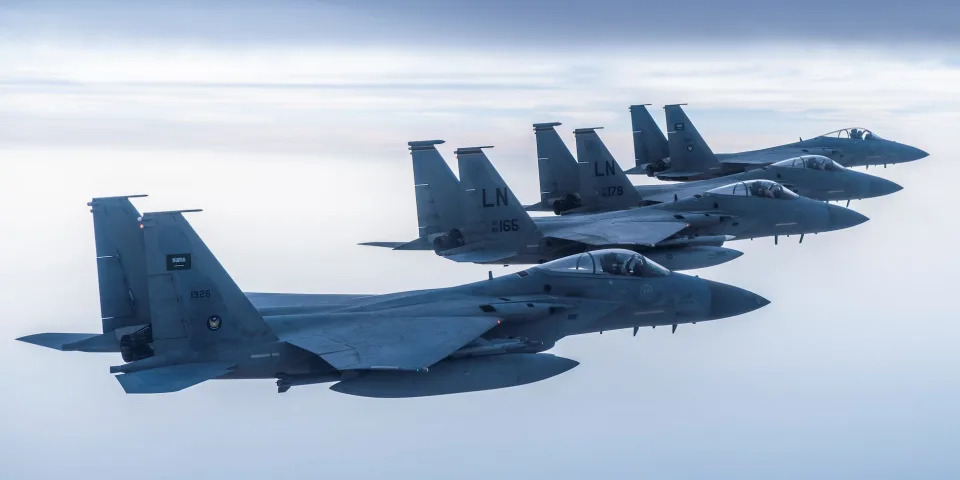
Royal Saudi Air Force F-15Cs fly with US Air Force F-15Cs in June 2019.
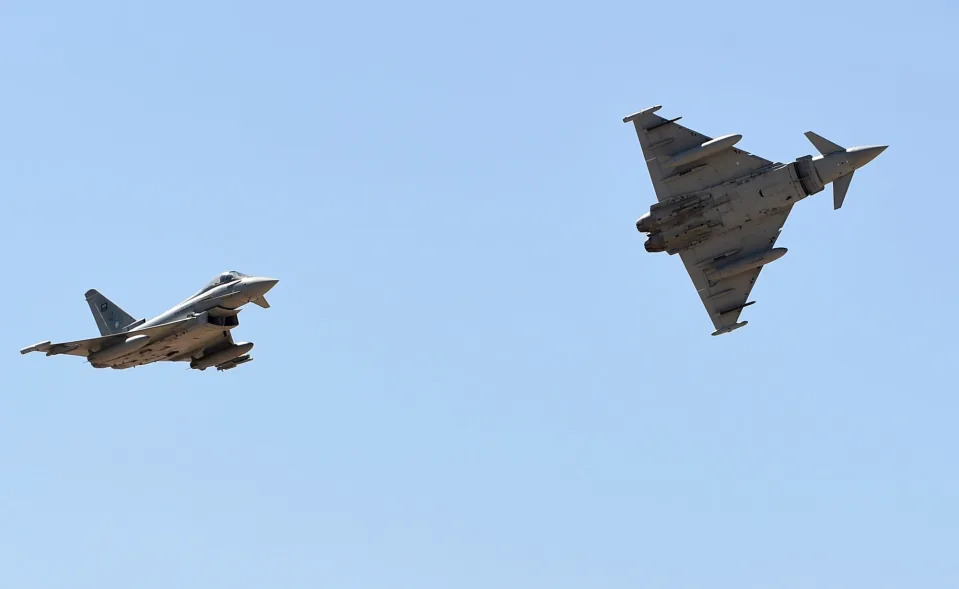
Saudi Eurofighter Typhoon fighter jets near Riyadh in January 2017.FAYEZ NURELDINE/AFP via Getty Images
Consequently, Saudi Arabia buying 100 or more Rafales would be a big "economic win" that would "score Riyadh an upgraded strategic partner outside of Washington or London," Roblin said, though he pointed out that Gulf states have a habit of hyping arms buys from new sources, including Russia or China, to elicit "jealous counteroffers from their 'main' strategic partners."
Ryan Bohl, a senior Middle East and North Africa analyst at the risk-intelligence company RANE, said Rafales could be an "attractive option" to Riyadh, considering the sanctions the US and Germany imposed on it after the assassination of the journalist Jamal Khashoggi in 2018.
French jets are also modern and built by a NATO country, potentially reducing issues with integrating the jets with the Saudis' other Western aircraft. France's less restrictive end-user agreements "underlines this attractiveness," Bohl added.
Riyadh's non-NATO options for jets are relatively limited, and buying Russian or Chinese jets would likely incur US sanctions, which makes Saudi interest in the Rafale seem "realistic," Bohl said. "Saudi Arabia wants to diversify its air force so that if it has an interruption with one of its arm suppliers, like the United States, its air wing doesn't grind to a halt."
Shifting US-Saudi ties

President Joe Biden and Crown Prince Mohammed bin Salman in July 2022.Bandar Algaloud/Reuters
In the near term, Saudi Arabia may find Rafales more burdensome than beneficial, given its extensive investment in US and British aircraft.
"I would be surprised if the Royal Saudi Air Force procured Rafale, given the size and well-established state of its F-15 and Typhoon fleets," Justin Bronk, an expert on airpower at the Royal United Services Institute, told Insider.
Such pragmatic concerns have kept Saudi Arabia from buying French fighters in the past. After all, Bohl said, it's much easier to build an air force with pilots who train on a single system or with systems from a single country of origin. And despite the sophistication of French military hardware, it hasn't been used in battle as much as US equipment has and therefore lacks a "combat record as a selling point" like US-made weapons, Bohl added.
Limits on the Rafale's technology and availability may also deter Riyadh.
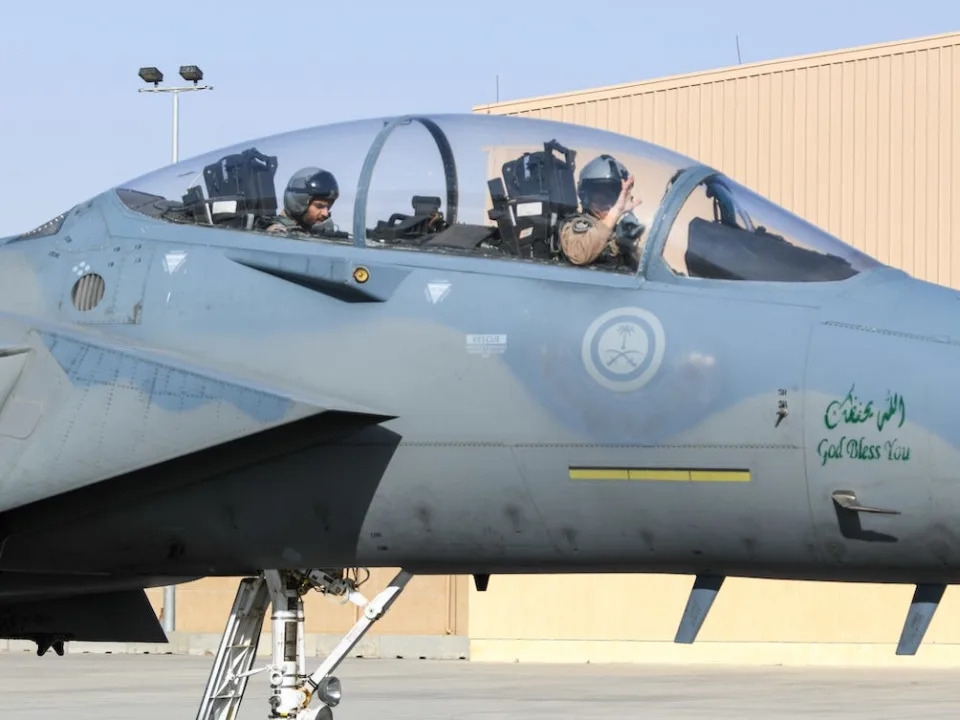
A Saudi Air Force F-15 taxis for takeoff at King Faisal Air Base in February 2021.US Air Force/Staff Sgt. Katherine Walters
While the Rafale F4 is "one of the most advanced and versatile of the 4.5-generation fighters on the market," it is "not a true stealth fighter" with the advanced capabilities Saudi Arabia wants, Roblin said.
Even if Riyadh ordered Rafales tomorrow, they would take at least several years to arrive. "Right now, a big problem is Dassault's factory is already booked with orders for over a hundred additional aircraft for Croatia, Egypt, India, Indonesia, Greece, and the United Arab Emirates," Roblin said.
The strength of US-Saudi relations has kept Riyadh firmly in the US camp for decades, but Bohl said that relationship has "fundamentally shifted" and the US is no longer "as expansive of a defense partner" as in the past, a trend that may add to the appeal of other countries' weapons.
"Under previous kings, Saudi Arabia saw the United States as a reliable protector of its security and was willing to do favors through energy policy and arms deals for Washington in exchange for this guarantee," Bohl told Insider. "That led to Riyadh being less willing to do special favors for the United States, like going to it exclusively for arms purchases."
Paul Iddon is a freelance journalist and columnist who writes about Middle East developments, military affairs, politics, and history. His articles have appeared in a variety of publications focused on the region.
Saudi Arabia sets its sights on Britain’s military jewelPaul Iddon
Updated Mon, August 21, 2023

Royal Saudi Air Force F-15Cs fly with US Air Force F-15Cs in June 2019.
US Navy/Handout via REUTERS
Saudi Arabia is reportedly considering a large number of French-made Dassault Rafale fighter jets.
Such a purchase would be a break from Saudi Arabia's long history of buying US and British jets.
This suggests Riyadh doesn't think its traditional partners will be as reliable in the future.
Saudi Arabia has spent decades building an enormous air force composed exclusively of advanced US and British fighter jets. But Riyadh's reported interest in potentially purchasing a large number of French jets may be a sign it doesn't think its longtime patrons are as reliable as before.
In December, France's La Tribune financial newspaper, citing unnamed sources, reported that Saudi Arabia was considering acquiring 100 to 200 Dassault Rafale fighters. The report came amid developments suggesting that the US and other nations might not provide military equipment to Riyadh in the future.
After Riyadh cut oil production in October, US lawmakers proposed legislation freezing all American arms sales to the kingdom, which could have grounded most of the Saudi air force and would further fray already strained US-Saudi relations.
In July, Germany announced it would not allow additional Eurofighter Typhoon fighter jets to be delivered to Saudi Arabia. The Saudi air force has 72 Eurofighters, second only to the number of US-made F-15s it has.
Saudi Arabia's neighbors in the United Arab Emirates and Qatar have built up large fleets of Western-made jets that include dozens of Rafales. The La Tribune report, while unconfirmed, suggests political and practical concerns are pushing the Saudis toward the French jet.
French appeal
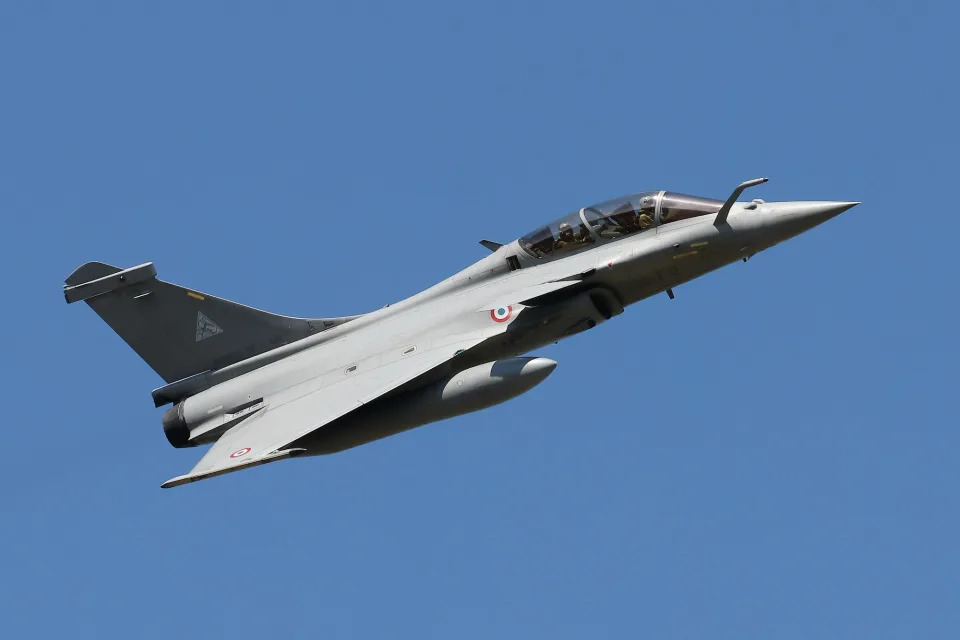
A French Dassault Rafale flying near Salon-de-Provence in May 2022.Toni Anne Barson/Getty Images
Buying more Typhoons would be "the sensible move" since the Saudis have the infrastructure to train pilots and operate that jet, "but a German block prevents that," said Sébastien Roblin, a widely published military-aviation journalist.
Saudi Crown Prince Mohammed bin Salman is "not currently inclined to throw Washington any free bones by ordering F-15EXs," and despite an "about-face" by President Joe Biden, Roblin said, the Saudis know that future jet sales "could be disrupted by domestic political revulsion for Riyadh's actions domestically or the war in Yemen."
As bin Salman pursues a detente with his main rival, Iran, and improves relations with China, opposition to such sales may only increase.
Roblin noted that France has sold armored vehicles, helicopters, artillery, air-to-ground Damocles targeting pods, and SCALP cruise missiles to Riyadh and that French political culture values having "a diversified, independent defense sector" and is therefore "much less susceptible to human-rights-based misgivings, which has enabled sustained arms sales to a wider stable of clients in the Middle East."
Saudi Arabia is reportedly considering a large number of French-made Dassault Rafale fighter jets.
Such a purchase would be a break from Saudi Arabia's long history of buying US and British jets.
This suggests Riyadh doesn't think its traditional partners will be as reliable in the future.
Saudi Arabia has spent decades building an enormous air force composed exclusively of advanced US and British fighter jets. But Riyadh's reported interest in potentially purchasing a large number of French jets may be a sign it doesn't think its longtime patrons are as reliable as before.
In December, France's La Tribune financial newspaper, citing unnamed sources, reported that Saudi Arabia was considering acquiring 100 to 200 Dassault Rafale fighters. The report came amid developments suggesting that the US and other nations might not provide military equipment to Riyadh in the future.
After Riyadh cut oil production in October, US lawmakers proposed legislation freezing all American arms sales to the kingdom, which could have grounded most of the Saudi air force and would further fray already strained US-Saudi relations.
In July, Germany announced it would not allow additional Eurofighter Typhoon fighter jets to be delivered to Saudi Arabia. The Saudi air force has 72 Eurofighters, second only to the number of US-made F-15s it has.
Saudi Arabia's neighbors in the United Arab Emirates and Qatar have built up large fleets of Western-made jets that include dozens of Rafales. The La Tribune report, while unconfirmed, suggests political and practical concerns are pushing the Saudis toward the French jet.
French appeal

A French Dassault Rafale flying near Salon-de-Provence in May 2022.Toni Anne Barson/Getty Images
Buying more Typhoons would be "the sensible move" since the Saudis have the infrastructure to train pilots and operate that jet, "but a German block prevents that," said Sébastien Roblin, a widely published military-aviation journalist.
Saudi Crown Prince Mohammed bin Salman is "not currently inclined to throw Washington any free bones by ordering F-15EXs," and despite an "about-face" by President Joe Biden, Roblin said, the Saudis know that future jet sales "could be disrupted by domestic political revulsion for Riyadh's actions domestically or the war in Yemen."
As bin Salman pursues a detente with his main rival, Iran, and improves relations with China, opposition to such sales may only increase.
Roblin noted that France has sold armored vehicles, helicopters, artillery, air-to-ground Damocles targeting pods, and SCALP cruise missiles to Riyadh and that French political culture values having "a diversified, independent defense sector" and is therefore "much less susceptible to human-rights-based misgivings, which has enabled sustained arms sales to a wider stable of clients in the Middle East."

Saudi Eurofighter Typhoon fighter jets near Riyadh in January 2017.FAYEZ NURELDINE/AFP via Getty Images
Consequently, Saudi Arabia buying 100 or more Rafales would be a big "economic win" that would "score Riyadh an upgraded strategic partner outside of Washington or London," Roblin said, though he pointed out that Gulf states have a habit of hyping arms buys from new sources, including Russia or China, to elicit "jealous counteroffers from their 'main' strategic partners."
Ryan Bohl, a senior Middle East and North Africa analyst at the risk-intelligence company RANE, said Rafales could be an "attractive option" to Riyadh, considering the sanctions the US and Germany imposed on it after the assassination of the journalist Jamal Khashoggi in 2018.
French jets are also modern and built by a NATO country, potentially reducing issues with integrating the jets with the Saudis' other Western aircraft. France's less restrictive end-user agreements "underlines this attractiveness," Bohl added.
Riyadh's non-NATO options for jets are relatively limited, and buying Russian or Chinese jets would likely incur US sanctions, which makes Saudi interest in the Rafale seem "realistic," Bohl said. "Saudi Arabia wants to diversify its air force so that if it has an interruption with one of its arm suppliers, like the United States, its air wing doesn't grind to a halt."
Shifting US-Saudi ties

President Joe Biden and Crown Prince Mohammed bin Salman in July 2022.Bandar Algaloud/Reuters
In the near term, Saudi Arabia may find Rafales more burdensome than beneficial, given its extensive investment in US and British aircraft.
"I would be surprised if the Royal Saudi Air Force procured Rafale, given the size and well-established state of its F-15 and Typhoon fleets," Justin Bronk, an expert on airpower at the Royal United Services Institute, told Insider.
Such pragmatic concerns have kept Saudi Arabia from buying French fighters in the past. After all, Bohl said, it's much easier to build an air force with pilots who train on a single system or with systems from a single country of origin. And despite the sophistication of French military hardware, it hasn't been used in battle as much as US equipment has and therefore lacks a "combat record as a selling point" like US-made weapons, Bohl added.
Limits on the Rafale's technology and availability may also deter Riyadh.

A Saudi Air Force F-15 taxis for takeoff at King Faisal Air Base in February 2021.US Air Force/Staff Sgt. Katherine Walters
While the Rafale F4 is "one of the most advanced and versatile of the 4.5-generation fighters on the market," it is "not a true stealth fighter" with the advanced capabilities Saudi Arabia wants, Roblin said.
Even if Riyadh ordered Rafales tomorrow, they would take at least several years to arrive. "Right now, a big problem is Dassault's factory is already booked with orders for over a hundred additional aircraft for Croatia, Egypt, India, Indonesia, Greece, and the United Arab Emirates," Roblin said.
The strength of US-Saudi relations has kept Riyadh firmly in the US camp for decades, but Bohl said that relationship has "fundamentally shifted" and the US is no longer "as expansive of a defense partner" as in the past, a trend that may add to the appeal of other countries' weapons.
"Under previous kings, Saudi Arabia saw the United States as a reliable protector of its security and was willing to do favors through energy policy and arms deals for Washington in exchange for this guarantee," Bohl told Insider. "That led to Riyadh being less willing to do special favors for the United States, like going to it exclusively for arms purchases."
Paul Iddon is a freelance journalist and columnist who writes about Middle East developments, military affairs, politics, and history. His articles have appeared in a variety of publications focused on the region.
Howard Mustoe
Sun, 20 August 2023
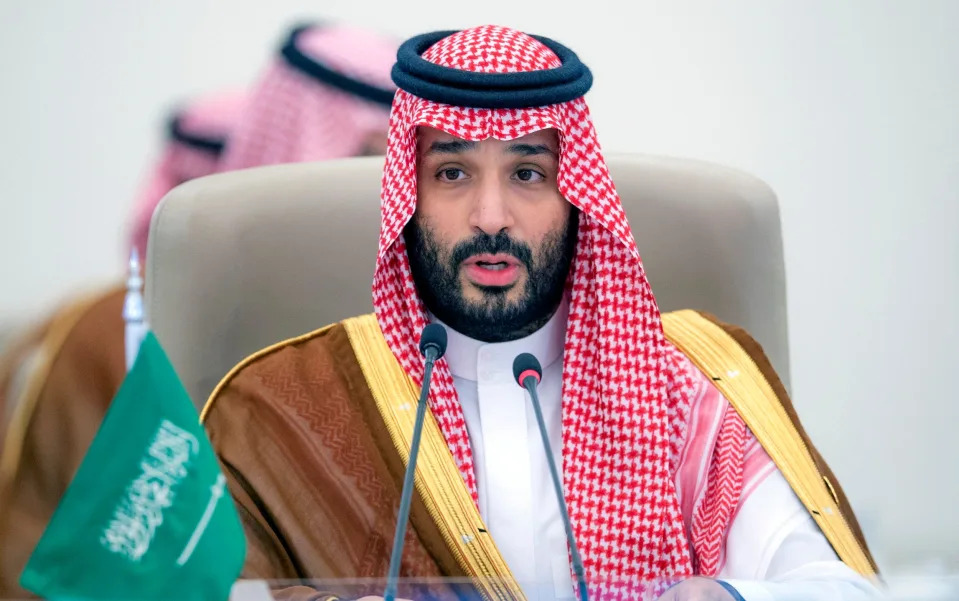
Mohammed bin Salman is attempting to reinvent the petrodollar kingdom - /SPA/AFP via Getty Images
Oil pumps have long dotted Saudi Arabia’s desert landscape, but they could soon be joined by a raft of factories.
Crown Prince Mohammed bin Salman wants to turn the country into the Gulf’s manufacturing powerhouse as it moves away from oil and gas.
The heir to Saudi Arabia’s $2 trillion throne wants to increase industrial exports to $148bn (£116bn) by 2030, tripling factory numbers to 36,000 by 2035 which will churn out everything from warships to cars.
So far, he has poured investment into Lucid, a US-based electric car maker which plans to build a factory in the country, while also striking a planned joint venture with Navantia, the Spanish state-owned builder of naval vessels.
Now, he has his sights set on another lucrative, albeit expensive and notoriously complex market – fighter jets.
It was announced last week that the controversial ruler is set to visit the UK in autumn, which came after a flurry of speculation around Saudi Arabia joining one of Britain’s largest military projects.
Downing Street reportedly wants to make the Kingdom part of the £72bn Tempest programme, initially, an Anglo-Italian effort which Japan joined last year.
Saudi’s deep pockets will be welcome, but industrial insiders are concerned about the nation’s technological offering, as well as its political baggage.
The Tempest project aims to bring a sixth-generation fighter jet into service by the middle of the next decade, replacing the Eurofighter Typhoon.
Notably, Saudi reportedly wants to become a formal partner in the programme rather than simply buying the finished product as a customer, as it has with the Typhoon.
Any partnership will need large capital investment, but it will secure Saudi new local jobs and a hand in designing Tempest, delivering the technological expertise the ruler craves.
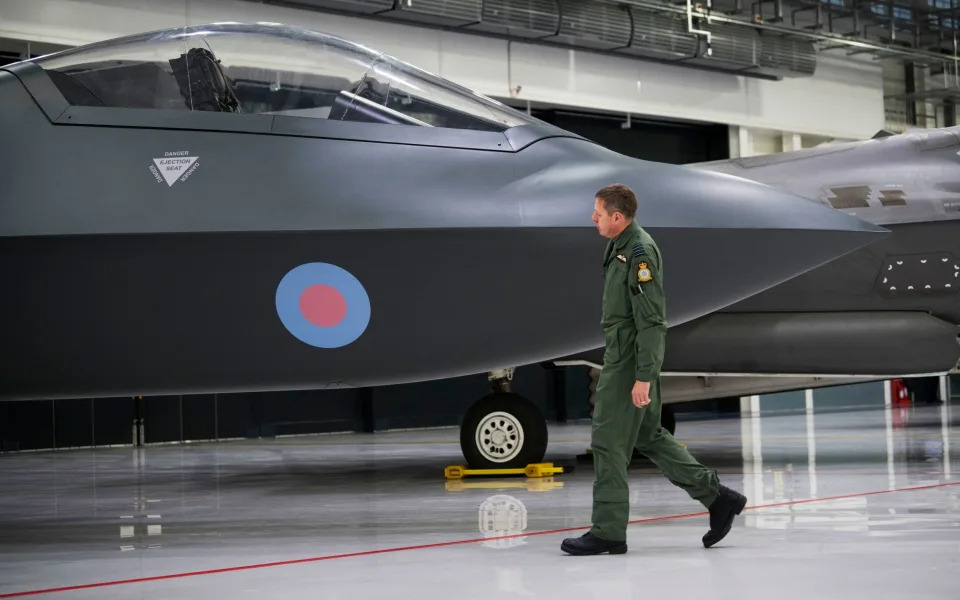
Saudi Arabia’s bid to join the Tempest fighter jet programme as an equal partner are said to have unsettled Japanese officials - David Rose
However, speculation around the state’s involvement, alongside the planned visit, has reignited concerns over the Kingdom’s human rights record and its approach to gay rights.
Homosexuality is still a criminal offence punishable by death, while the country is also involved in a years-long war in Yemen.
It will also be Mohammed bin Salman’s (MBS) first UK visit since the murder of Washington Post journalist Jamal Khashoggi, who was killed and dismembered on the orders of the Crown Prince, according to analysis by the CIA.
He has denied any involvement.
From a financial perspective, the huge cost of building ever more complex military hardware makes the country an attractive bet with its wealth and keen stance.
But bringing on such a controversial partner has already caused reported discomfort among Japanese officials.
Another question raised by insiders is what the country can add in terms of high-end jet design, with only a handful of countries in the world capable of building supersonic aircraft.
Under MBS, however, Saudi Arabia has supercharged its investment and ambitions in industry, technology and defence as part of the Vision 2030 programme, as the ruler aims to wean the country off oil.
“Through the national industrial strategy and in partnership with the private sector, the Kingdom will become a leading industrial powerhouse that contributes to securing global supply chains and exports high-tech products to the world,” MBS said last year.
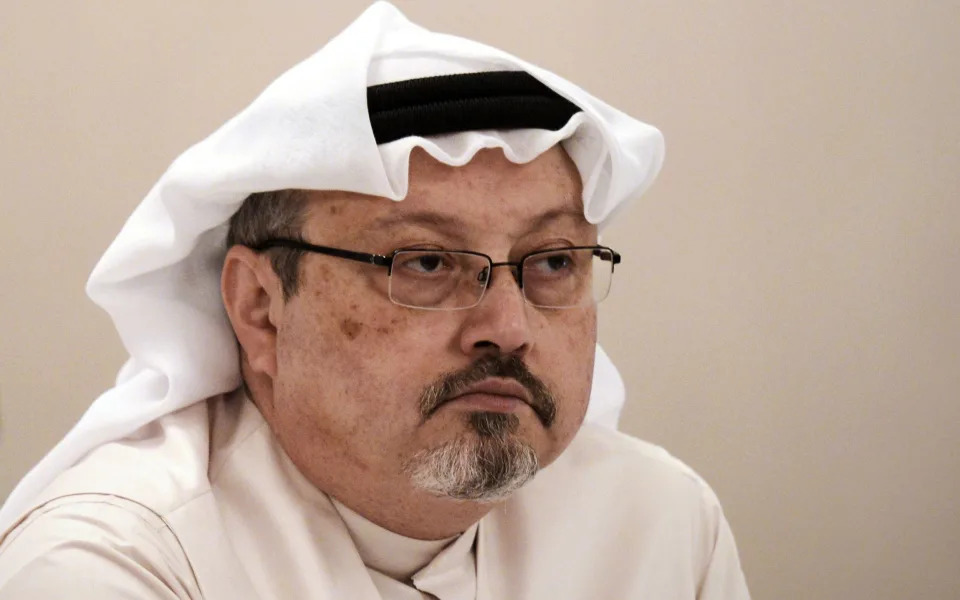
The brutal murder of Saudi journalist Jamal Khashoggi in 2018 still casts a shadow onto perceptions of the Kingdom today - MOHAMMED AL-SHAIKH / AFP
The country already has a manufacturing champion in Saudi Arabia’s Basic Industries Corporation, known as SABIC.
With prominence in the chemical sector, it also makes car parts, cosmetics ingredients and metals, bringing in $53bn in sales last year.
The country is also liberalising at pace, says Roxana Mohammadian-Molina, a former investment banker and finance technology entrepreneur, who has done business in Saudi Arabia.
“When you go there it is completely unexpected compared to the preconceived idea that people have,” she said. “It is very open. I have travelled there alone many times, you really feel very safe.
“They are very open to doing business. They are really keen to partner with other countries, particularly the UK universities that can attract talent.”
She pointed to the recent success of Tamara, a payment platform based in Riyadh which picked up a $150m loan from Goldman Sachs in March.
“Ambitions are very high. I think this is a very long process, you’re not going to become a tech hub overnight,” she says. “But the thing is in Saudi Arabia, things move very quickly.”
Liberalisation is among the changes taking place in the country, she added.
“You have big cities like Riyadh that are very advanced and progressive and have a young population, but you also have smaller cities and towns that are still very traditional, it is a fine balance for those interests.”
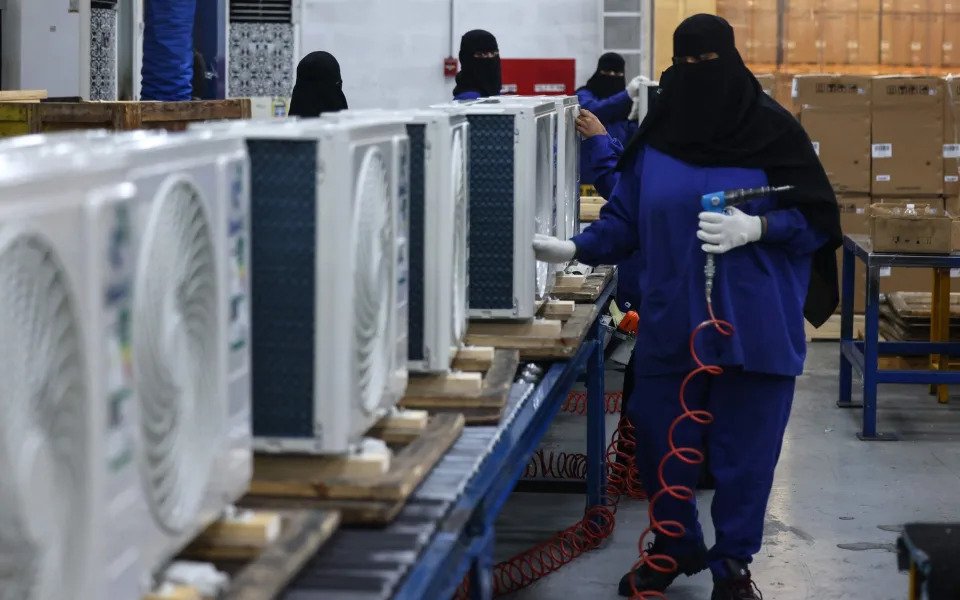
Women are playing a greater role in the Saudi economy as efforts to liberalise the Gulf state gather pace - FAYEZ NURELDINE/AFP
Saudi Arabia is likely to employ a broad spread of investments before focusing on areas it can excel, said Ayham Kamel, head of Eurasia Group’s Middle East and North Africa research team.
“I think it requires them to have experimented with different sectors for a while before they double down,” he says. “It’s really a wide net. I would expect it to be more focused in the future, but we are not there yet.”
The country’s investments today range from stakes in Nintendo, Uber and Boeing, to Newcastle United FC and its controversial takeover of Golf’s PGA tour through its LIV Golf rival.
Saudi also wants to become a leader in artificial intelligence and is hoovering up the specialist computer chips necessary to develop an AI economy, according to recent reports
Mr Kamel says Riyadh is “ambitious to get into the high-tech industry and migrate part of the production in Saudi Arabia”, he adds.
Riyadh’s plan to increase its defence industrial knowledge is already underway.
In December, the Kingdom signed its deal with Spanish shipbuilder Navatia to form a joint venture to build warships. The final details of the deal will be ironed out next year, but the agreement allows for all of the construction to be done in Saudi shipyards.
The deal allowed the country to “localise military industry” defence minister Prince Khaled bin Salman said at the time.
UK investment chiefs are now keen to snap up more of Saudi’s income rather than see it go to rivals like Spain.
One City veteran who has experience investing in the country expressed frustration about the poor perception of Saudi Arabia in press coverage.
He said: “Saudi Arabia is changing for the good at a stunning speed and to be honest the parts of the press coverage here have been almost profligate in their jaundiced, biased reporting.
“Saudi is far more than Khashoggi. And British business is considered good business. Saudi is the UK’s primary trading partner in the Middle East and the UK is Saudi Arabia’s closest European ally.”
The country was the UK’s 10th-biggest export customer for services last year and Britain enjoys a £7bn trading surplus with Saudi.
But in the eyes of outside investors and potential customers, its human rights record must improve. The country executed 196 people last year, the highest number since Amnesty International started recording the numbers 30 years ago.
Polly Truscott, Amnesty International UK’s foreign policy adviser, said MBS “must be properly held to account for abuses by Saudi officials, including Khashoggi’s murder, the widespread use of torture in Saudi jails and the indiscriminate bombing of civilians in Yemen.”
No comments:
Post a Comment